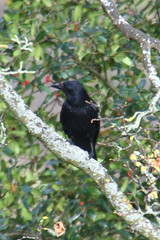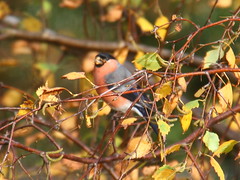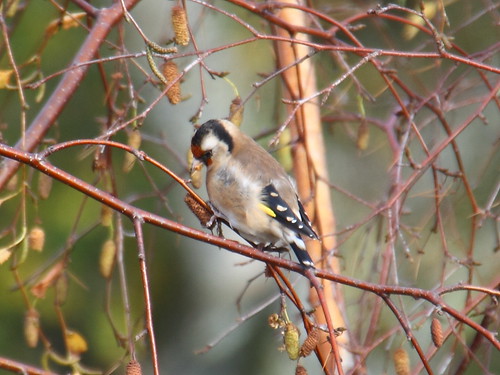I am not a patient person. You have to be patient to be a good wildlife photographer. I took about two hundred pictures of birds the other day, one hundred and ninety of them of a bird’s backside, and the other ten of an unfocused bunch of leaves, blowing in the wind. I have ONE pretty good photograph.
One. And it’s not even perfect.
These guys are at present tweetling around the tree in front of my office window. I identify bluetits, robins, and some sort of finch. Or wren? The ravens and magpies stalk by, looking mildly affronted. Everyone is zipping about, eating, arguing, defending territory, playing coy. I love birds; they give my eyes something to follow while I’m thinking. As much as I love watching them, though, I kind of wince as they fly so close to the windows. I just know we’re going to have an accident one of these days. But, until then, the birds continue to live dangerously, kamikaze bounding from branch to branch, diving head-first into the freedom of flight.
from Rilke’s Book of Hours
(as translated by Anita Barrows and Joanna Macy)
Shared today for A., who has bravely taken wing
♦ ♦ ♦ ♦
How surely gravity’s law,
strong as an ocean current,
takes hold of the smallest thing
and pulls it toward the heart of the world.Each thing—
each stone, blossom, child—
is held in place.
Only we, in our arrogance,
push out beyond what we each belong to
for some empty freedom.If we surrendered
to earth’s intelligence
we could rise up rooted, like trees.Instead we entangle ourselves
in knots of our own making
and struggle, lonely and confused.So like children, we begin again
to learn from the things,
because they are in God’s heart;
they have never left him.This is what the things can teach us:
to fall,
patiently to trust our heaviness.
Even a bird has to do that
before he can fly.
It seems that Rilke is saying that we each have our place, and that when we get beyond our place, we get confused and messed up. At the same time, he advocates learning how to fail, and how to fail.
This poem always brings to mind another by Jack Gilbert, Failing and Flying, in which he talks about Icarus. Icarus is the antithesis of what Rilke was saying. Here’s a dude who tried to fly – when the average dude can’t. Surely he was out of place, out of time; flying into the face of what is supposed to be. There he flew; thus he fell. Or is that it?
So many times, when failure looms, people say, “well, she should have known better anyway.” Human nature is very odd. Extravagant gestures, while we seem to applaud them from unknown celebrities, are almost always frowned upon from “ordinary” people. (Who are you, to be be brilliant, gorgeous, talented, fabulous?) When a massive gamble fails to pay off, we are almost always eager to indulge in schadenfreude, to participate in grasping and throwing down to a hard landing someone’s fine dream. When a crash occurs where the breath is shocked out of the body, and the skin burns on impact, we are part of the Greek chorus caroling, “It was too good to be true, it was too perfect to last; I told you so.”
(That’s a human sickness; birds tend not to gloat when one of their tribe hits the window in some aerial escapade gone wrong. So, why do we? Is it because we actually all tend to want to “push out beyond what we each belong to
for some empty freedom”? A rhetorical question, think amongst yourselves.)
And yet: all failure is not failure. Jack Gilbert points out that Icarus was aloft — he flew. Flying wasn’t failure. Falling wasn’t failing, for him, but merely, the end of that success.
Success does not always last forever.
I am grateful for both: the strange appearances of success, and the temporary nature of failure. I am thankful for the continued human impetus to try, to step out of the perception of where we are supposed to be, and where gravity has held us, to embrace the lesson of trusting to the heaviness of falling – and failing – over and over again, until we wing aloft, and our victory is sweet, even if only for awhile.
More poetry at Laura’s new and improved Writing the World for Kids today.



I’m just reading this today. Thank you. I am reminding myself every day: try, try, try.
Flying is so totally worth it.
Love those photos, too.
I love birds, Tanita. I sit and watch the birds and feel such calm and peace. They’re truly spectacular and healing. Your last paragraph is beautiful:
I am grateful for both: the strange appearances of success, and the temporary nature of failure. I am thankful for the continued human impetus to try, to step out of the perception of where we are supposed to be, and where gravity has held us, to embrace the lesson of trusting to the heaviness of falling – and failing – over and over again, until we wing aloft, and our victory is sweet, even if only for awhile.
Thanks for this.
Love love this post! Gorgeous bird pictures. Well worth all those tries. You could make a special collage of all the bird backsides :). Nothing is ever wasted.
I needed to read Rilke today. Those “knots of our own making” — yes yes so true. Trust your heaviness. Thanks for your beautiful words!!
I SERIOUSLY am a bad bird photographer.
…but I’ll take the backside idea under advisement…
“Two hundred failure are worth one pretty good shot.”
I need to try to live this mantra. It’s hard, though, to apply it to my teaching life. All of the state mandates and the new requirement that our evaluation as teachers be tied to the learning of our students makes it hard to live with the 200 failures. What if that’s the picture about our teaching that gets captured, and not those rarer moments of shining glory and amazing student learning?!?!
Still, I’ll try living it.
(your bird shots are fabulous…heading to Flickr now, hoping to see some of what you call your “failures”!)
Ach, Mary Lee. That’s a hard thing to have to work with.To me, it’s ridiculous – when I was teaching, the thing I had to remind myself was that I was a doorkeeper; I was an opener-of-the-portal-of-opportunity. The success or failure of my students was not entirely within my keeping; THEY had to do the work. However, this new mandate doesn’t seem to take that into consideration, and I am really sorry. It is awfully shortsighted. Hang in there, cuz!
I do that same thing with photographing my children. Still living in hope that I will get a decent holiday picture one of these days. (Of the two of them together, I mean.) I think we are meant to have some failures so that the success means more.
Awesome bird photos; very interesting poem.
I love this, Tanita. I think you shared it before here or with the PP and I loved it then, too. It’s wonderful to have great poems put under my nose repeatedly–I need that.
I have a guest blog post up somewhere, nothing in-depth, but it’s about failure: http://www.5by5design.com/inspiration?module=blog&showitem=137
Thanks for joining in on Poetry Friday!
Behind every good shot there are many failures, no? 🙂
Beautiful photo, and gorgeous Rilke poem. It reminds me of a quote from Willa Cather: “There are only two or three human stories, and they go on repeating themselves as fiercely as if they had never happened before.”